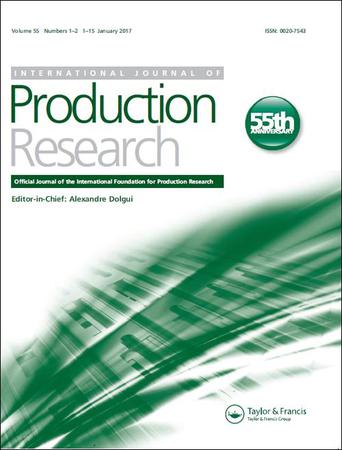食品工业中数字孪生过程控制:基于两个案例研究的框架建议
IF 7.3
2区 工程技术
Q1 ENGINEERING, INDUSTRIAL
International Journal of Production Research
Pub Date : 2023-09-28
DOI:10.1080/00207543.2023.2260495
引用次数: 0
摘要
摘要如今,食品工业中的许多过程都以自动方式进行监控,目的是尽量减少对劳动力的需求,并确保对食品质量和安全的适当控制。所有传感器都与一个集中管理单元共享数据,通常由制造执行系统收集和评估数据。然而,根据最近的研究报告,可以采取进一步措施,利用工业4.0支持技术,实施数字孪生方法,以防止生产过程中可能出现的问题。根据这些考虑,这项工作旨在展示两种不同的数字孪生模型,旨在改善对许多实际食品系统的控制。以液体和粉末流体为例,突出两种食品工艺优化的差异,并充分探索数字孪生方法的潜力。最后,基于两家试点工厂的真实数据,描绘了食品行业最佳数字孪生工具选择的框架。关键词:数字孪生生产计划和控制食品工艺过程控制工业4.0披露声明作者未报告潜在利益冲突。数据可用性声明支持本研究结果的数据可向通讯作者G. Vignali教授索取。Notes1 https://www.ni.com/it-it/shop/labview.html.2 https://www.bornemann.com/en-US/Home/.3 https://www.rtautomation.com/technologies/modbus-rtu/.4 http://www.kimo.it/wp-content/uploads/2016/10/24025.pdf.5 https://www.aec-smd.it/prodotto/m60sh86-to0512xxxc.6 https://www.aec-smd.it/product/smd1104lie.7 https://www.modbus.org/docs/PI_MBUS_300.pdf.8 https://www.ni.com/it-it/innovations/white-papers/14/the-modbus-protocol-in-depth.html.Additional informationNotes contributorsGiovanni保罗·卡洛Paolo Carlo Tancredi,帕尔马大学工业工程专业博士生。他于2020年毕业于帕尔马大学机械工程专业,并以研究员的身份开始了他的研究生涯,“在机器和机器组件的先进解决方案领域进行分析和实施,以改善工作安全条件”。他目前的研究领域是用于数据分析和生产系统监控的数字孪生。Eleonora Bottani自2019年11月起担任帕尔马大学工程与建筑系工业物流全职教授。她于2002年以优异的成绩毕业于工业工程与管理专业,并于2006年在帕尔马大学(University of Parma)获得工业工程博士学位,目前她在帕尔马大学担任多项学术职务。从科学的角度来看,她主要从事与物流和供应链管理相关的研究;次要主题是指工业厂房区域。她是科学论文的作者(或合著者)超过200篇(在Scopus上引用超过3800次;H-index = 32),担任60余种国际期刊的裁判,5种科学期刊的编委,多种期刊的副主编,1种科学期刊的总编辑。Giuseppe Vignali是帕尔马大学的副教授。他于2004年毕业于帕尔马大学机械工程专业。2009年,他获得了与食品加工分析和优化相关的工业工程博士学位。他的研究活动涉及食品加工/包装和工业厂房的安全/保障。他的研究成果涉及的主题发表了150多篇科学论文,其中大部分被Scopus数据库收录(Scopus引文数>1650;H-index = 22)。本文章由计算机程序翻译,如有差异,请以英文原文为准。
Digital twin-enabled process control in the food industry: proposal of a framework based on two case studies
AbstractNowadays many processes in the food industry are monitored in an automatic way, with the purpose of minimising the need for workforce and of ensuring the proper control of the quality and safety of the foodstuff. All the sensors share data with a centralised management unit, where often a Manufacturing Execution System collects and evaluates them. As reported in recent research, however, a further step that can be undertaken, exploiting Industry 4.0 enabling technologies, is the implementation of digital twin approaches, with the additional aim to prevent possible issues during production. In line with these considerations, this work aims at showing two different digital twin models intended for improving the control of as many real food systems. Liquid and powder fluids are taken as examples for highlighting the differences in the optimization of the two food processes, as well as for fully exploring the potential of the digital twin approach. Finally, based on the real data taken from two pilot plants, a framework for the selection of the best digital twin tool in the food sector is delineated.KEYWORDS: Digital twinproduction planning and controlfood processesprocess controlIndustry 4.0 Disclosure statementNo potential conflict of interest was reported by the author(s).Data availability statementData that support the findings of this study are available on request to the Corresponding author, prof. G. Vignali.Notes1 https://www.ni.com/it-it/shop/labview.html.2 https://www.bornemann.com/en-US/Home/.3 https://www.rtautomation.com/technologies/modbus-rtu/.4 http://www.kimo.it/wp-content/uploads/2016/10/24025.pdf.5 https://www.aec-smd.it/prodotto/m60sh86-to0512xxxc.6 https://www.aec-smd.it/product/smd1104lie.7 https://www.modbus.org/docs/PI_MBUS_300.pdf.8 https://www.ni.com/it-it/innovations/white-papers/14/the-modbus-protocol-in-depth.html.Additional informationNotes on contributorsGiovanni Paolo Carlo TancrediGiovanni Paolo Carlo Tancredi is Ph.D. Student in Industrial Engineering at the University of Parma. He graduated in Mechanical Engineering at the University of Parma in 2020, and began his research career, as a Research Fellow, with ‘Analysis and implementation in the field of advanced solutions on machines and assemblies of machines for the improvement of safety conditions at work’. His current field of research concerns the Digital Twin for data analysis and monitoring of production systems.Eleonora BottaniEleonora Bottani is full professor of Industrial Logistics at the Department of Engineering and Architecture of the University of Parma since November 2019. She graduated (with distinction) in Industrial Engineering and Management in 2002 and got her Ph.D. in Industrial Engineering in 2006, both at the University of Parma, where she currently has numerous academic duties. From a scientific point of view, she is active in research primarily related to logistics and supply chain management topics; secondary topics refer to the industrial plants area. She is author (or co-author) of >200 scientific papers (citations on Scopus >3800; H-index = 32), referee for more than 60 international journals, editorial board member of five scientific journals, Associate Editor for various journals, and editor-in-chief of a scientific journal.Giuseppe VignaliGiuseppe Vignali is Associate Professor at the University of Parma. He graduated in Mechanical Engineering at the University of Parma in 2004. In 2009, he received his Ph.D. in Industrial Engineering related to the analysis and optimization of food processes. His research activities concern food processing/packaging and safety/security of industrial plants. Results of his studies related to those topics which have been published in more than 150 scientific papers, mostly which are indexed in Scopus database (citations on Scopus >1650; H-index = 22).
求助全文
通过发布文献求助,成功后即可免费获取论文全文。
去求助
来源期刊

International Journal of Production Research
管理科学-工程:工业
CiteScore
19.20
自引率
14.10%
发文量
318
审稿时长
6.3 months
期刊介绍:
The International Journal of Production Research (IJPR), published since 1961, is a well-established, highly successful and leading journal reporting manufacturing, production and operations management research.
IJPR is published 24 times a year and includes papers on innovation management, design of products, manufacturing processes, production and logistics systems. Production economics, the essential behaviour of production resources and systems as well as the complex decision problems that arise in design, management and control of production and logistics systems are considered.
IJPR is a journal for researchers and professors in mechanical engineering, industrial and systems engineering, operations research and management science, and business. It is also an informative reference for industrial managers looking to improve the efficiency and effectiveness of their production systems.
 求助内容:
求助内容: 应助结果提醒方式:
应助结果提醒方式:


